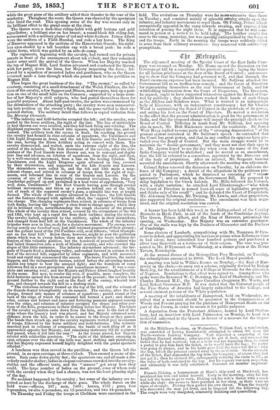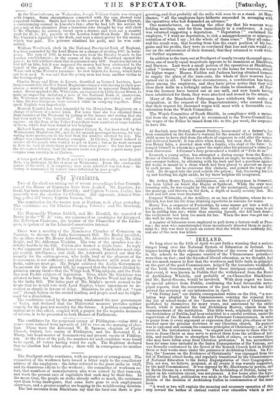grtrapolio.
The adjourned meeting of the Special Court of the East India Com- pany was resumed on Monday. Mr. Hume opened the discussion on the Government bill by a repetition of his previous speech ; laying the blame for all Indian grievances at the door of the Board of Control ; endeavour- ing to show that the Company had governed well, and that through the Board enormous expenses had been incurred. Mr. Sullivan attacked the Government bill as an inefficacious remedy ; and the Court of Directors for representing themselves as the real Government of India, and for withholding information from the Court of Proprietors. The Directors, he argued, ought to have supported tebmselves against the Board of Con- trol by publicity ; they should have washed their hands of such things as the Affghan and Scindean wars. What is wanted is an independent body of Directors, with an independent constituency ; but Sir Charles Wood is maintaining the Board of Control in the plenitude of its power, and setting his foot on the Court of Directors. He moved a resolution to the effect that the present administration is good for the government of India, and that the proposed change will impair the principal check on the Board of Control. Differing in much from Mr. Sullivan, but agreeing also in much, Mr. Holt Mackenzie seconded the resolution. Sir James Weir Hogg replied to some parts of the "sweeping denunciation" of the present system contained in Mr. Sullivan's speech : he contended that the Court has great power, and that in any conflict its opinions have pre- vailed over the Board of Control. But the main struggle would be to maintain the "double government," and they must not shut their eyes to it. Mr. Ayrton hoped to see the day when even the name of the East India Company would be abolished ; and he moved as an amendment, that the bill be referred to a committee, appointed by the Directors out of the body of proprietors. After an interval, Mr. Sergeant Gaselee seconded the amendment. Shortly afterwards the meeting was adjourned.
Colonel Sykes renewed the discussion on Tuesday, by an elaborate de- fence of the Company ; a denial of the allegations in the petitions pre- sented to Parliament, which he dismissed as consisting of " crass ignorantim" ; and an attack on the Government Bill. He proposed to delay legislation to the Greek kalends. Mr. Mills followed the Colonel, with a slight variation : he attacked Lord Ellenborough—" who when the Court of Directors is named loses all sense of legislative propriety, and thinks only of his recall" ; and he defended the Court of Proprietors. Mr. Alderman Salomons, Mr. Twining, Mr. Lewin, and other proprietors, also supported the original resolution. The amendment was then nega- tived, and the original resolution was carried.
A bazaar has been held this week in the Riding-school of the Cavalry Barracks in Hyde Park, in aid of the funds of the Cambridge Asylum. The Queen, Prince Albert, and the King of }layover, patronized the opening, on Wednesday. Her Majesty was an extensive purchaser. One of the stalls was kept by the Duchess of Gloucester and the Duchess of Cambridge.
Some electors of Lambeth, sympathizing with Mr. Tennyson D'Eyn- court in defeat, and appreciating his services at a time when Reformers were in bad odour, have subscribed four hundred guineas and purchased a silver vase therewith as a testimony of their esteem. The vase was pre- sented to Mr. D'Eyncourt on Wednesday, at a dinner given at the Horns Tavern, Kennington.
At the annual dinner of the Metropolitan Free Hospital, on Tuesday, the subscriptions amounted to 20001. The Lord Mayor presided.
A meeting was held in Willis's Rooms on Monday,—the Earl of Har- rowby in the chair,—to carry out a scheme, originally devised by Bishop Berkeley, for the establishment of a College at Bermuda for the education of Negroes. Resolutions to that effect were agreed to. Among those who spoke were the Reverend W. C. Dowding, the Earl of Shaftesbury, and Mr. Charles Howard M.P., the Negro Canadian clergyman Mr. Wardc, and Lord Robert Grosvenor M.P. It was stated that the Coloured people of the Free States of America had largely subscribed to the College, and several eminent persons of the White population.
A meeting of the inhabitants of Hampstead, held on Wednesday, re- solved that a memorial should be presented to the Commissioners of Woods and Forests praying for the purchase of Hampstead Heath on the part of the Crown, in order to secure it for public purposes.
A deputation from the Protestant Alliance, headed by Lord Shaftes- bury, had an interview with Lord Palmerston on Monday, to band in a memorial addressed to the Queen in favour of a measure for the inspec- tion of nunneries.
At the Middlesex Sessions, on Wednesday, William Earl, a watchmaker, was convicted of having fraudulently attempted to obtain 50/. from the North-western Railway Company. Earl deposited a carpet-bag at the Leighton Buzzard station ; subsequently he got it back, and returned the ticket that he had received; but as a train was not departing then, he asked a porter to give him back the ticket, as he u ould leave the bag; the porter was going to dinner, and in his haste gave Earl the ticket but did net take the bag, which the prisoner carried away by the next train. On the strength of the ticket, Earl demanded the bag from the Company ; of course they had not got it ; then he claimed 501., subsequently reducing the claim to 301., as the value of tools contained in the bag. But his roguery was soon suspected, and ultimately it was fully established. Sentence six months' imprison- ment.
Francis Picking, a hammerman at Mare's ship-yard at Blackwell, has murdered his wife and killed himself. Early in the morning, after his boy had left the house to go to work, Picking cut his wife's throat with a razor while she slept: she seems to have perished in her sleep, as there were no signs of struggle. Picking then gashed his own throat. 'When the tragedy was discovered the man yet lived, and he lingered till the following day. The couple were very dissipated, constantly drinking and quarrelling.
At the Mansionhouse, on Wedueeday, Joseph William Smith was charged with forgery. Some circumstances connected with the case showed very i:npudent boldness. Smith had been in the service of Mr. William Clayton, a conveyancing counsel in Lincoln's Inn ; after he had left his service he got a key of the chambers from a laundress who thought he was still clerk to Mr. Clayton; he entered, forced open a drawer, and took out a country draft for 4/. 7s. 2d., payable at the London Joint Stock Bank. He forged Mr. Clayton's signature to the draft, and sent a street-porter for the money, which was paid. The prisoner admitted his guilt, and he was com- mitted.
William Woodward, clerk in the National Provincial Bank of England, has been remanded by the Lord Mayor on a charge of stealing 100/. hi bank- notes. The sum of 2051. in notes was sent from the Dursley branch to the London establishment ; in the course of his duties Woodward opened the parcel; he told a fellow-clerk that it contained only 105/. Suspicion did not at first fall on him, but it was supposed the money had been abstracted in the transit of the parcel. Two of the notes, each for 101., were changed by Woodward at the Waterloo terminus : he took tickets for Jersey, which have not been used. It was said that the young man has been another victim to the betting-shops.
Charles Brcese and Klaas de Leeuw, described as licensed hawkers, have been remanded by the Bow Street Magistrate charged with having in their pos- session a number of fraudulent papers intended to represent Dutch bank- notes. Breese applied to Mr. Whiteman, an engraver in Little Queen Street, to make an engraving imitating a note of the National Bank of Amsterdam. Mr. Whiteman informed the Police. The engraving proceeded ; and after a time the two foreigners were arrested while in company together. They speak English very imperfectly.
Hannah Ponffrot has been remanded by the Marylebonc Magistrate on a charge of robbery of a novel kind. For some time she has obtained linen from families at the West-end by culling at the houses and stating that she had been sent by "the laundress." She carried on the system with great success : on the floor of the Police Court there were numbers of large bundles of linen, which had been found at her lodgings.
Richard Turner, master of the steamer Citizen K, has been fined by the Westminster Magistrate 101., and 2s. 6d. on each passenger in excess, for con- veying more passengers in his boat than the number allowed by law. The offence was committed on Sunday sennight. At Chelsea, Turner refused to receive all the people who wanted to get on board ; but as he went onwards to Lew he took in sixty-three persons from other piers : the last fact upset the attempted defence, that the master could not prevent a great many pas- s engers from rushing in at Chelsea.
A. large part of Messrs. M‘Neill and Co.'s patent felt-works, near Dunhill Row, was destroyed by fire at noon on Wednesday. From the combustible nature of the stock it is surprising that more mischief was not done : the factory is surrounded by narrow lanes inhabited by poor people.



























 Previous page
Previous page